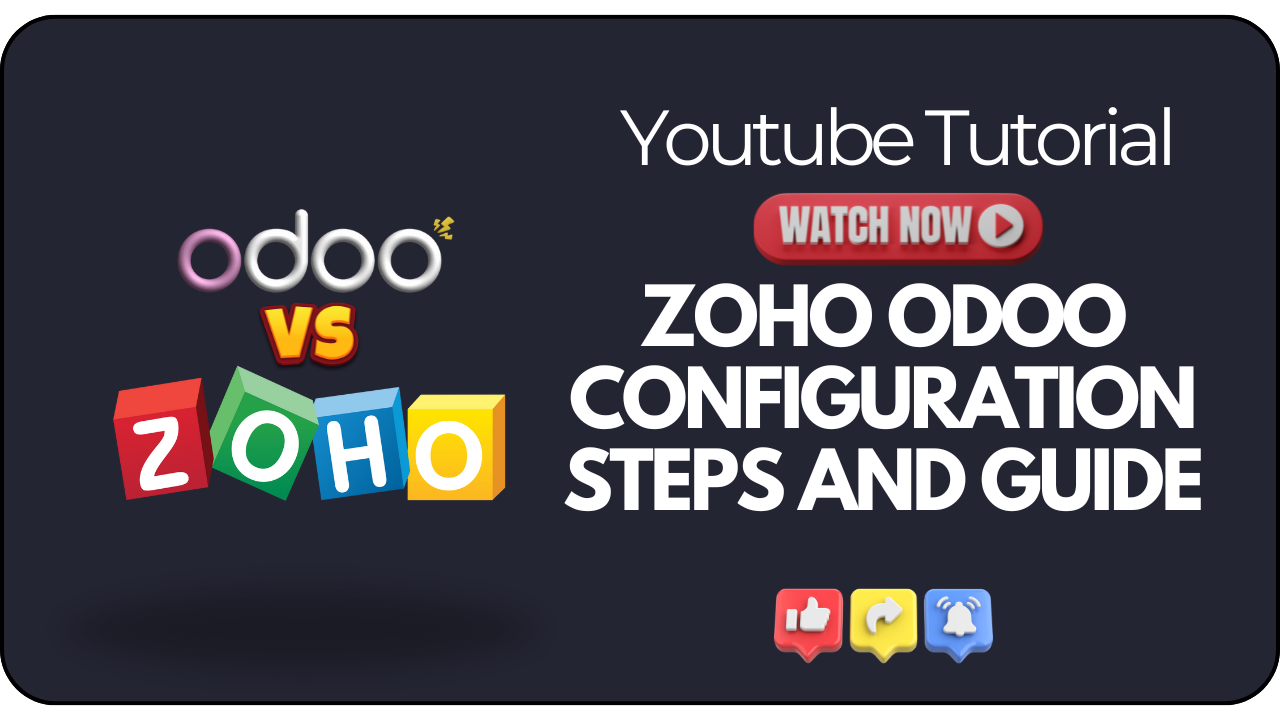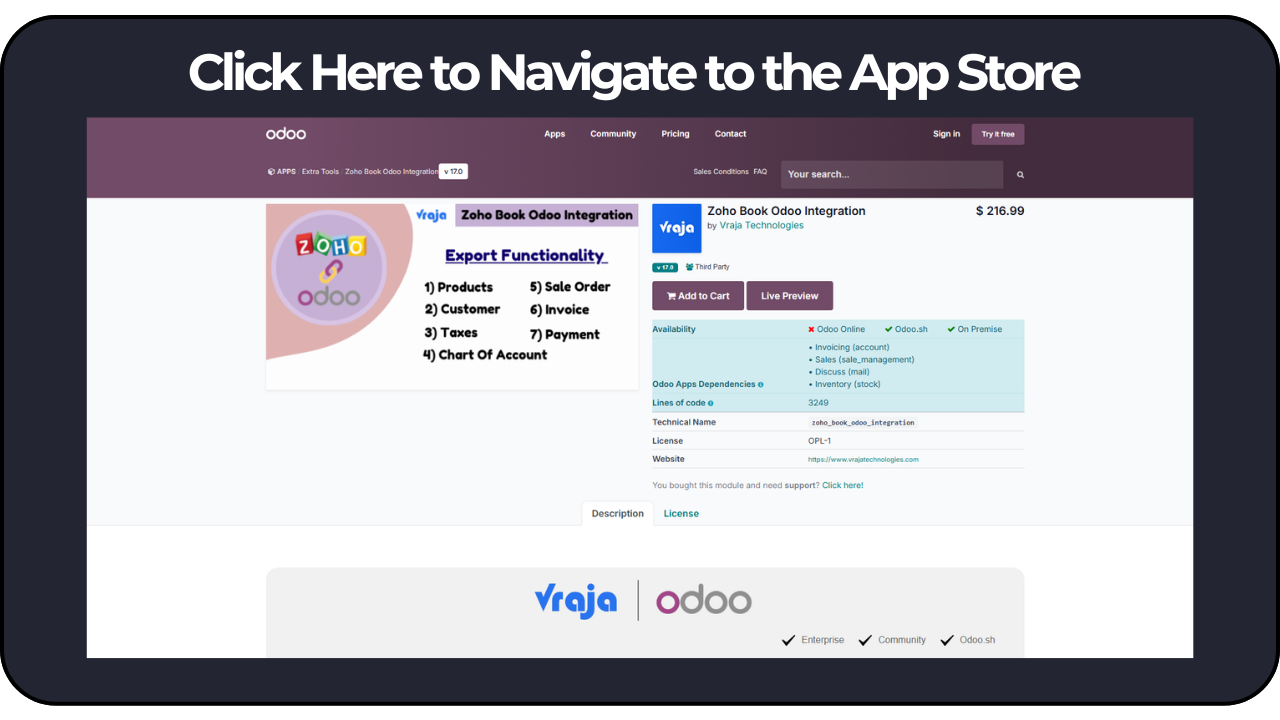Selecting an appropriate ERP can be difficult, and you are not alone in this. In 2024, there will be many SaaS ERP systems, each with advantages and disadvantages.
We shall examine Odoo vs. Zoho in this article. Both systems are effective in simplifying processes. The user-friendly design of Zoho is well-known for getting you up and running more quickly than you can say "productivity boost." Conversely, Odoo is the king of customization and is prepared to satisfy your business requirements.
Get ready for an enterprise resource planning journey that will help you understand the advantages and disadvantages of each platform so you can choose the one that best suits your company's objectives.
Together, we can identify the ideal ERP to meet your operating needs.
Comparing the Features of Odoo with Zoho?
It's critical to acknowledge that both integrated management systems, Zoho and Odoo, provide distinct benefits catered to different operational requirements. Here is a thorough analysis of their salient characteristics:
Zoho
- Focuses on the features of customer relationship management, or CRM.
- Provides price tiers according to the number of users and features.
- Renowned for having an easy-to-use UI.
- Offers strong integration in its in-house ecosystem.
Odoo:
- Provides a wide variety of modules to meet various organizational requirements.
- Because of its open-source framework, it is very customizable.
- able to adjust to certain industrial needs.
- Both the Community (free) and Enterprise editions are accessible.
While Odoo stands out for its extensive business coverage and high degree of customisation, Zoho CRM shines in CRM and usability.
Industry Use
Considering reviews and recognitions-based user experience research from Capterra, we can state that Odoo is a top tool to apply for:
- Production Scheduling;
- Manufacturing Management & Execution;
- Point of Sale;
- E-Commerce;
- Retail POS Systems;
- Inventory Management;
- Lead Management.
However, in terms of Manufacturing Management, Zoho One lacks:
- Sell Set Kits;
- Alternative Work Center;
- Product Unbuilt;
- Master Production Schedule;
- Repair Management
Finally, in Rental Management, we don’t expect Zoho to offer:
Gantt Scheduling;
Price Management.
These industry-specific characteristics, as we can see, provide more insight into the usefulness of these tools: While Odoo is a flexible tool that can be tailored to the intricate workflows of manufacturing, retail, e-commerce, and other industries that demand sophisticated inventory management and customized solutions, Zoho is mostly used as a CRM software to automate linear sales and marketing operations.
Benefits: Odoo
Modular Approach:
Odoo is well known for its modular design, which lets you choose and use just the features and apps that are necessary for your company. This adaptability keeps you from being overloaded with pointless features.
Integration:
A wide range of integrated business applications, including accounting, sales, inventory, HR, CRM, and e-commerce, are offered by Odoo. A consistent data flow throughout your company is ensured by the smooth integration of these apps.
Customizability:
Odoo is quite adaptable due to its open-source nature and user-friendly development environment. The system can be customized to fit your unique business needs.
User-Friendly Interface:
Odoo provides a cutting-edge and simple user interface that makes it easy for your staff to get used to the system, lowering the learning curve and boosting output.
Community and Support:
Odoo has a robust and vibrant user base that provides information, modules created by the community, and assistance. For more comprehensive help, you can also use paid support and services.
Scalability:
Odoo may expand together with your company. You can expand by adding new applications and functionalities as your needs evolve.
Frequent Updates:
Odoo is updated and improved on a regular basis, guaranteeing that your system is always running the newest security fixes, performance upgrades, and features.
Drawbacks: Odoo
Cost:
Although Odoo has an open-source version, there may be licensing fees for some of its more sophisticated features and support, which could raise financial issues.
Benefits : Zoho
All-inclusive Suite:
Zoho offers a collection of cloud apps for a number of company needs, such as email marketing, project management, and customer relationship management. You can handle several facets of your company from a single platform with the integrated approach.
User-Friendly Interface:
Zoho apps are renowned for having intuitive user interfaces that make it simple for staff members to become familiar with and use the system.
Affordability:
With a transparent pricing structure and free options for small enterprises, Zoho provides an affordable solution.
Excellent Customer Support:
Zoho's customer service is well rated for being prompt and helpful, giving users the support they require to efficiently use the program.
Drawbacks: Zoho
Limited Customization:
Compared to Odoo, Zoho may offer fewer customization choices, which could be a disadvantage for companies with very particular or unusual needs.
Modularity:
Rather than being a completely modular system, Zoho is a collection of applications. This might result in the use of several software programs for various business purposes.
Scalability Issues:
When your company grows or expands significantly, Zoho could not be as easily scalable as Odoo.
Conclusion: Choosing Wisely
The particular needs, financial constraints, and growth trajectory of your company will determine which of Odoo and Zoho is best for you. Odoo is appropriate for companies with particular and changing demands because it provides more extensive and adaptable capabilities. On the other hand, for companies seeking a comprehensive portfolio of cloud apps, Zoho offers a simple and affordable option.
Think about performing a comprehensive study of your company's needs, financial limitations, and scalability requirements in order to make the best decision. Both Odoo and Zoho offer advantages, and your particular goals should guide your choice.
Odoo Zoho Connector by Vraja Technologies:
Integrating Zoho with Odoo combines Zoho's versatile suite of cloud-based business applications with Odoo's robust and customizable ERP system. This integration enables smooth data flow between the two platforms, helping businesses manage CRM, accounting, inventory, and more in a unified system. By connecting Zoho’s easy-to-use tools with Odoo’s modular and scalable architecture, organizations can streamline operations, improve workflow efficiency, and enhance decision-making through real-time data synchronization.
| #hireodoodeveloper #odoocustomization #odooerp #erp #demo #tutorial #zoho #erp # features #comparison #industry #customization #cost #userfriendly #scalability #integration #migration #sales #modular |

